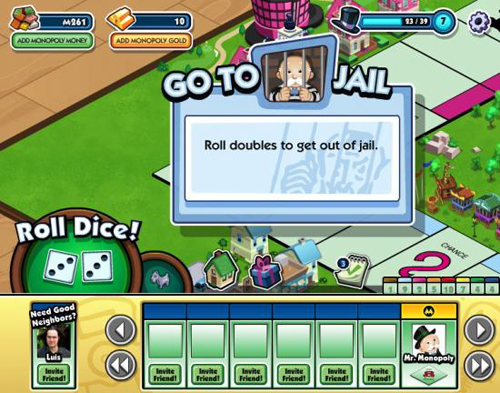Playfish制作人谈《百万大富翁》进军Facebook之路
社交开发商Playfish曾肩负推出《百万大富翁》Facebook版本的艰巨任务,企图再创经典棋盘游戏的神话。从该游戏400万月活跃用户,以及一系列好评来看,《百万大富翁》的确取得了成功。日前Gamezebo采访了该游戏制作人Adam Gutterman,谈到开发团队面临的各个挑战,以及粉丝新期待等方面的内容。以下为游戏邦编译的访谈内容:
当初为何想把《百万大富翁》带入Facebook平台?是什么因素让游戏与Facebook平台一拍即合?
一直以来,《大富翁》就是炙手可热的棋盘游戏品牌。而Facebook是全球最大的游戏平台。二者的联姻自然存在无限的发展空间。
Facebook版本的游戏虽然和原始的棋盘游戏颇为相似,但其实有些地方大为不同。你们是如何取舍相关游戏内容?
棋盘游戏竞争激烈,目标很明确,同时玩家参与人数有限。而社交游戏与此相反:游戏注重合作,持久性高,且对于社交互动的人数没有限制。挑战之处在于判断何种棋盘游戏功能在社交环境中可以得到充分发挥。我们保留了游戏的核心机制:摇骰子、收集财产卡片以及建房子、建旅馆。但是,社交游戏玩家并不是在同一地盘上争夺空间,而是基于各自的地盘。此外,拜访朋友的地盘也被融入到了摇骰子的核心机制中。没有一款社交游戏将拜访朋友作为核心游戏机制,《百万大富翁》可以算是首开先河。
你们为什么会采用异步的游戏设置?
异步玩法是为了配合Facebook玩家,因为他们大多都是在日常生活或者工作的闲暇时间玩游戏。这些时间可能和他们的朋友并不同步,因此我们采用了异步的游戏设置。
自定义元素在原始的棋盘游戏中并不存在,但却成了Facebook《大富翁》不可或缺的部分。你们为什么会有这么的想法?
自定义元素其实就是我们所说的创造性表达的代名词,这是许多社交游戏的一大特点。我们希望玩家可以充分展示自己的创造性,展示房屋、旅馆的装潢,地盘的装饰。每次拜访朋友的街道时,我总是为各式各样的颜色组合,建筑构造惊叹不已。
在把经典的《大富翁》体验带入Facebook时,你们有没有遇到什么困难?
《大富翁》问世迄今已经有75年的历史,这也是Facebook版本的《大富翁》备受瞩目的原因之一。我们得考虑用户的期望,同时努力使推出的作品能够像原始棋盘游戏一样受大众喜爱,我认为我们没有令大家失望。
玩家的反应如何?
首先,我们在Facebook星级评价(总分5分)中获得了4.3分。值得一提的是,我们获得了压倒性的积极评价,这款游戏成了热门话题。我在游戏中添加了颇有竞争性的“陷阱”(Traps)功能。用户对于陷阱功能的反应差别很大,有的很困惑,有的表示不屑。运营一个在线游戏项目的好处在于,你可以根据玩家的反应来不断完善游戏。陷阱功能很快就会被合作性的新功能“款待”(Treats)所取代,我有预感款待功能会大受欢迎。
这款游戏未来还会进行调整或者更新吗?
除了推出款待功能,我们还会在游戏中添加其他新功能。我不会过多评论相关细节,但我认为:棋盘的中心位置是个有待挖掘的空间。在目前的版本中,旅馆的造型也很有限。在接下来的几个礼拜里,我们将会着手处理这个问题,为游戏添加新机制、新功能。
最后你想会对游戏粉丝说些什么吗?
我代表《大富翁》团队及Playfish、EA全体成员对粉丝的支持表示衷心感谢。我们期望能够进一步拓展《百万大富翁》项目,使游戏成为最具社交性的独特游戏。(本文为游戏邦/gamerboom.com编译,转载请注明来源:游戏邦)
A social spin on a classic: Playfish talks Monopoly Millionaires on Facebook
The developers at Playfish had an unenviable task with Monopoly Millionaires: to recreate a classic, much loved board game for Facebook. And with over four million monthly active users and much critical acclaim (including our own 4.5 star review) it looks to have been a success. Gamezebo recently had a chance to chat with Adam Gutterman, the producer on the game, about the types of challenges the team faced during development and what fans can expect next.
Why did you decide to bring Monopoly to Facebook in the first place? What was it about the two that made them a good fit?
Monopoly is the most popular and iconic board game brand in the history of the world. Facebook is the largest gaming platform in the world. The sky was the limit in the opportunity of that marriage.
The game is very similar to the board game, but also different in some pretty significant ways. How did you decide which aspects to keep and which ones to remove?
Board games are competitive in nature and have well-defined end game goals. Furthermore, only a limited number of players may participate. Social games are just the opposite; they are cooperative and persistent, and allow for social interaction with an unlimited number of friends. The challenge lay with determining what features of the board game would work well in a social gaming setting. We kept the core mechanic of rolling dice, collecting property cards, and building houses and hotels. However, rather than competing for space on a shared board, players build on their own board. Additionally, visiting your friends’ boards is baked into the core mechanic of rolling dice. No other social game features friend visitation in the core game play. Monopoly Millionaires is the first to feature this.
Why did you decide to use asynchronous-style gameplay?
Asynchronous play naturally dovetails with the way that social gamers play on Facebook. Most users play when they take breaks from their daily routine at work or home. These times don’t always synch with their friends, hence the idea behind asynchronous gameplay.
The customization aspect is something that doesn’t really exist in the board game, but yet it’s a pretty big part of Millionaires. Where did that idea come from?
Customization is another word for what we call creative expression, something that is a hallmark of many social games. We wanted players to be able to show off their creations and arrangements of the houses, hotels, and decorations on the board. When I visit my friends’ streets, I am always surprised and delighted by the various combinations of colors and buildings that I see.
What were some of the difficulties you found in translating the classic Monopoly experience to Facebook?
Monopoly has been around for 75 years. With that storied history comes a nearly infinitive number of distinct expectations for what Monopoly would look like on Facebook. We had to manage these expectations while still trying to put out a product that would be as close to universally loved by the public as the board game. We think we came pretty close.
What has the reaction been like from players?
For one, we have a 4.3 out of 5.0 star rating on Facebook. More specifically, the feedback we’ve received has been overwhelmingly positive, with perhaps one point of contention. We rolled out the game with a highly competitive feature called Traps. Traps were met with reactions ranging from confusion to disdain. The great thing about running a live game service is that you can listen to your players and make improvements. Traps are soon going to be replaced by a cooperative feature called Treats. I have a feeling people are really going to love Treats.
Are there any future changes or updates in the works?
Beyond Treats, we have a number of new features in the works. I can’t comment on too many specifics, but I’ll say this: The middle of the board is an underutilized space. And hotels are limited in their current incarnation. In the coming weeks we’ll be addressing this, adding some great new mechanics and features to the game. Again, I have a feeling people are going to love it.
Any last words for your fans?
From all of us here on the Monopoly team and at Playfish and EA, thank you so much for your support. We look forward to continuing to develop Monopoly Millionaires and making it one of the most social and unique games on the web.(Source:Gamezebo)








































 闽公网安备35020302001549号
闽公网安备35020302001549号